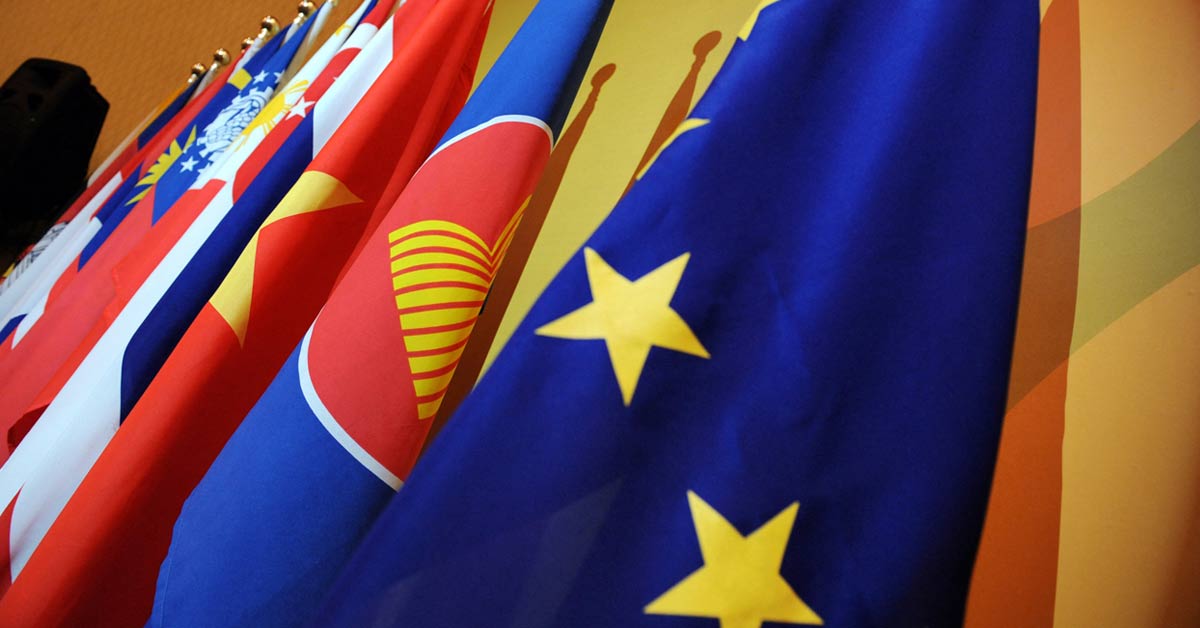As the year draws to an end, we looked back at some of the events that have marked the relationship between ASEAN and the European Union. The list is not by no means exhaustive.
The Inaugural ASEAN-EU Health Summit
Organized by the EU-ASEAN Business Council (EU-ABC), an organization that promotes European businesses in the Southeast Asian bloc, it took place in September in Singapore and saw the participation of high-level officials from across Southeast Asia and Europe, as well as business leaders, members of the diplomatic corps, and academics.
With an eye to the COVID-19 pandemic, the summit looked at how countries around the world can plan and implement strategies to protect economies and societies from future globally disruptive events.
“The summit was organized by the EU-ABC, a business organization, and saw the participation of several high-level officials and experts,” said Igor Driesmans, the EU Ambassador to ASEAN. “[The summit] looked at several key issues such as the approval process of vaccines, production and distribution of vaccines and how to tackle new strains of SARS-Cov-2.”
“So, anything that fosters cooperation at any level between member states and organizations of the two blocs is welcome,” Driesmans added.
COP26
Asia, and ASEAN in particular, is growing rapidly and its energy requirements, while still low by Western standards, are increasing. This gives ASEAN nations the opportunity to be at the forefront of the green energy revolution.
Giuseppe Jacobelli, a Hong Kong-based analyst and author with over 30 years of experience in Asia, thinks ASEAN can be at the forefront of the process of energy decarbonization.
“COP26 is a reaffirmation that ASEAN nations must continue on their path of energy decarbonization and digitalization,” Jacobelli says.
“Most ASEAN countries are emerging economies, and their energy supply has enormous potential for growth. The Philippines, with a population of 110 million, generated 102 terawatt-hours in 2020, and Indonesia, with 274 million people, generated 275 terawatt-hours, for example. This compares to 1,005 terawatt-hours for Japan, with a population of 126 million. So, ASEAN nations have enormous scope to build green-energy capacity.”
“However, project-financing challenges and at-times lacklustre government policy have rendered the process of adding clean energy assets slower than expected - perhaps except for Vietnam. At the COP26 event, the energy and capital markets transition were reaffirmed and highlighted, and the momentum created will help many ASEAN nations to accelerate green investments,” concludes Jacobelli.
G20
While not all ASEAN member states were invited or took part in the latest G20 summit in Rome at the end of October, Singapore, Indonesia and Brunei were there and the conclusions reached during the meeting will have far-reaching effects on all ASEAN member states. More so as Indonesia takes over the rotating presidency of the G20 from Italy.
William Pesek, an award-winning Tokyo-based Asia analyst and author, sees two main issues that ASEAN needs to tackle in the coming year and looks at how Indonesia can play a crucial role in making ASEAN’s voice heard.
“I’d say ASEAN should put two main issues on the G-20 table: global cooperation on COVID-19 vaccines and for the economic giants to tread carefully in 2022,” Pesek says.
“The first issue is one Indonesian President Joko Widodo has already telegraphed. He wants the G-20 to strengthen the global health architecture. Specifically, Jakarta wants ASEAN, including Indonesia, to become a key mRNA-based vaccine production hub. This would both increase the supply of vaccines and also pressure pharmaceutical giants to share their formulas with the developing world.”
“The second issue is the coming storm of rate hikes from the Federal Reserve and other major monetary powers. And from tensions between the US and China. Donald Trump may be gone, but the retaliation arms race between Washington and Beijing remains,” he adds.
“From 1997 to the 2013 ‘taper tantrum,’ Southeast Asia tends to be collateral damage when the Fed tightens. After 20 months of pandemic lockdowns and massive increases in government spending, Asia is even more vulnerable to capital flights than it was in years past. So, ASEAN should be asking the globe’s top powers to take an economic Hippocratic Oath: when making major policy shifts, try to avoid derailing emerging Asia. The more the G-20 can work together, at least on the big stuff, the better off ASEAN will fare in 2022,” Pesek concludes.
Asia-Europe Meeting (November 2021)
This year’s summit looked at the challenges posed by the post-pandemic social and economic recovery, green transformation, regional and global security issues such as Afghanistan and the denuclearization of the Korean peninsula.
“Multilateral cooperation, and a strong Europe-Asia relationship, in particular, is crucial for our global recovery… We believe it is important for all ASEM partners to work together to ‘build back better’ - in a more green, digital, sustainable, and inclusive way,” said Charles Michel, President of the European Council, in his remarks at the opening session of the meeting.
“The environment is high on the EU agenda,” echoed Driesmans. “We have launched several programs to support ASEAN cities to become greener and implement digital solutions.”
The Smart Green ASEAN Cities program is one of them. The program, which provides about EUR5 million in grants, will promote more sustainable urbanization while reducing environmental and carbon footprints.
ASEAN-EU Comprehensive Air Transport Agreement
This is the world’s first bloc-to-bloc air transport agreement, and it will allow airlines of member countries to expand services to and within the respective regions.
The agreement will allow airlines of member states to fly any number of non-stop flights between countries in both regions. Airlines will also be able to fly up to 14 weekly passenger services and any number of cargo services via and beyond to any third country.
“Although the agreement is one to two years away from coming into effect, as it still needs to go through a legal review, signing and then ratification by national parliaments, it represents a landmark step in the relationship between the two blocs and will help boost business confidence and support economic recovery,” says Driesmans.
The International Air Transport Association, an industry association, has estimated that the aviation industry suffered a loss of US$126.4 billion in 2020 due to the global coronavirus pandemic emergency and forecasts losses of around US$50 billion for 2021, so anything that can support air travel is welcome.
And one, last but not least, a forward-looking event. 2022 will mark the 45th anniversary of the EU-ASEAN formal relationship and will be celebrated with a summit, likely in Brussels toward the end of 2022, where all EU and ASEAN leaders will attend.
The views expressed in this article are the author’s own and do not necessarily reflect those of The ASEAN Post.

